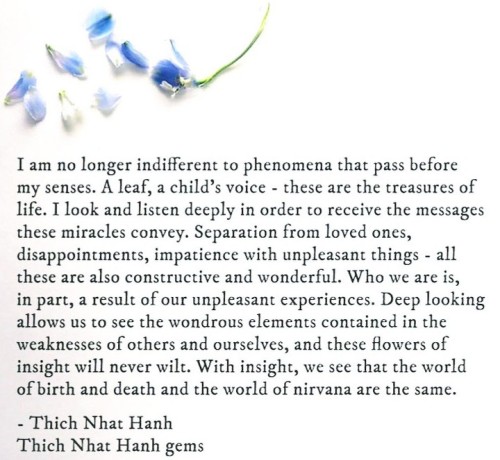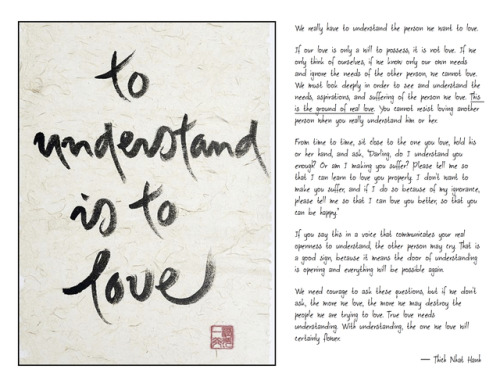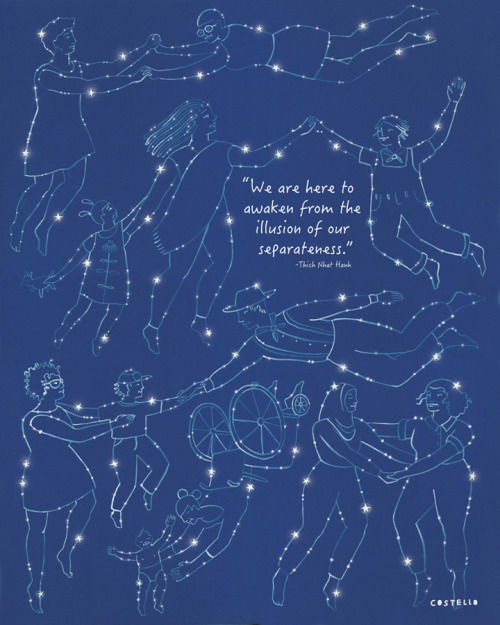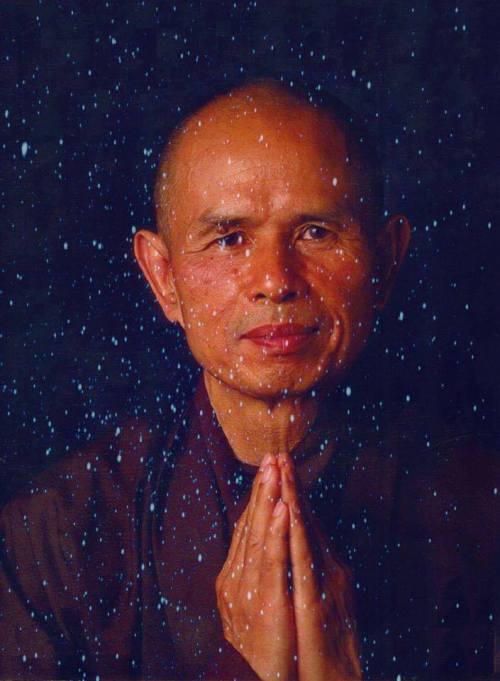#thich nhat hanh
[image: scattered pale blue petals next to a small, vivid blue flower. Below is a quote. “I am no longer indifferent to phenomena that pass before my senses. A leaf, a child’s voice - these are the treasures of life. I look and listen deeply in order to receive the messages these miracles convey. Separation from loved ones, disappointments, impatience with unpleasant things - all these are also constructive and wonderful. Who we are is, in part, a result of our unpleasant experiences. Deep looking allows us to see the wondrous elements contained in the weaknesses of others and ourselves, and these flowers of insight will never wilt. With insight, we see that the world of birth and death and the world of nirvana are the same.” - Thich Nhat Hanh]
Post link


’Breath Like The Trunk Of A Tree’ is a zine by British zinester, Jean McEwan.
She describes it as “an instant book of belly breathing with words from Thich Nhat Hanh”.
If you’d like a copy, DM her on Twitter.
I’ve been working through Thich Nhat Hanh’s amazing book, Peace Is Every Step. This particular quote resonated with me so strongly that I decided to make it into an image, so I can put it on my fridge as a reminder. And then I decided to share it with y’all. You can download it as a PDF to print here.
Transcript of image:
We really have to understand the person we want to love.
If our love is only a will to possess, it is not love. If we only think of ourselves, if we know only our own needs and ignore the needs of the other person, we cannot love. We must look deeply in order to see and understand the needs, aspirations, and suffering of the person we love. This is the ground of real love. You cannot resist loving another person when you really understand him or her.
From time to time, sit close to the one you love, hold his or her hand, and ask, “Darling, do I understand you enough? Or am I making you suffer? Please tell me so that I can learn to love you properly. I don’t want to make you suffer, and if I do so because of my ignorance, please tell me so that I can love you better, so that you can be happy.”
If you say this in a voice that communicates your real openness to understand, the other person may cry. That is a good sign, because it means the door of understanding is opening and everything will be possible again.
We need courage to ask these questions, but if we don’t ask, the more we love, the more we may destroy the people we are trying to love. True love needs understanding. With understanding, the one we love will certainly flower.
— Thich Nhat Hanh
Post link
“People normally cut reality into compartments, and so are unable to see the interdependence of all phenomena. To see one in all and all in one is to break through the great barrier which narrows one’s perception of reality.”
—Thích Nhất Hạnh
“The moment I die
I will try to come back to you
as quickly as possible.
I promise it will not take long.
Isn’t it true
I am already with you
as I die each moment?
I come back to you
in every moment.
Just look,
feel my presence.
If you want to cry,
please cry,
And Know
that I will cry with you.
The tears you shed
will heal us both.
Your tears and mine.
The earth I tread this morning
transcends history.
Spring and Winter are both present in the moment.
The young leaf and the old leaf are really one.
My feet touch deathlessness,
And my feet are yours.
Walk with me now.
Let us enter the dimension of oneness
and see the cherry tree blossom in Winter.
Why should we talk about death?
I don’t need to die
to be back with you.”
~Thich Nhat Hanh
Post link

On one occasion, the Buddha saw in his vision that five hundred young maidens from Pancasala village were due to attain Sotapatti Fruition on that day after listening to Dhamma from him. So the Buddha went to stay near that village. The five hundred maidens went to the riverside to have a bath; after the bath they returned to the village fully dressed up in ornaments as it was a festival day. About the same time, the Buddha entered Pancasila village for alms-food but none of the villagers offered him anything because they had been possessed by Mara.
On his return to the village gate, the Buddha met Mara, who promptly asked him whether he had received much alms-food.
The Buddha saw the hand of Mara in his failure to get any alms-food on that day and replied, “You wicked Mara! It was you who turned the villagers against me. Because they were possessed by you they did not offer any alms-food to me. Am I not right ?” Mara made no reply to that question, but he thought that it would be fun to entice the Buddha back to the village and get the villagers to insult the Buddha by making fun of him. So he suggested, “O Buddha, why don’t you go back to the village again? This time, you are sure to get some food.”
Just then, the five hundred village maidens arrived on the scene and paid obeisance to the Buddha. In their presence, Mara taunted the Buddha, “O Buddha, since you received no alms-food this morning, you must be feeling the pangs of hunger!” To him the Buddha replied, “O wicked Mara, even though we do not get any food, like the Abhassara brahmas who live only on the delightful satisfaction (piti) and bliss (sukha) of jhana, we shall live on the delightful satisfaction and bliss of the Dhamma.”
Then the Buddha spoke in verse as follows:
“Happily do we live, who have no properties to worry about. Feeding on joy we live like deities of the Abhassara Heaven of radiance”
At the end of the discourse, having a pleasant mindset about the Buddha and having understood the blessing of the Nibbana, the five hundred maidens attained Sotapatti Fruition.

The Buddha visited the Tavatimsa deva realm to expound the Abhidhamma to Deva Santusita, who had been his mother. During that time, there was a deva (a deity) named Indaka in the realm of Tavatimsa. Indaka, in his last existence as a man, had offered a little alms-food to Thera Anuruddha. As this good deed was made to a thera within the period of the Buddha’s Teaching he was amply rewarded for it. Thus, after his death he was reborn in the Tavatimsa realm and was lavishly bestowed with the luxuries of the deva world. Thera Anuruddha was an Arahant Bhikku with great qualities which made the offering far more beneficial for the poor man.
At that time, there was also another deva by the name of Ankura in Tavatimsa who had given much in charity; in fact, many times more than what Indaka had given. But his charity was made outside the period of the Teaching of any of the Buddhas. So, in spite of his lavish and grand charities, he was enjoying the benefits of the life of a deva on a much smaller scale than Indaka, who had offered very little. As the Buddha was then at Tavatimsa, Ankura asked him the reason for the discrepancy in gaining the benefits. To him the Buddha answered, “O deva! When giving charities and donations you should choose whom you give, for acts of charities are just like seeds. Seeds put into fertile soil will grow into strong, vigorous plants or trees and will bear much fruit; but you had sown your seed in poor soil, so you reap poorly.”
Then the Buddha spoke in verse as follows:
Verse 356. Weeds damage fields; lust spoils all beings. Therefore, giving to those free from lust yields great benefit.
Verse 357. Weeds damage fields; ill will spills all beings. Therefore, giving to those free from ill will yields great benefit.
Verse 358. Weeds damage fields; ignorance spoils all beings. Therefore, giving to those free from ignorance yields great benefit.
Verse 359. Weeds damage fields; covetousness spoils all beings. Therefore, giving to those free from covetousness yields great benefit.
Both of the deities attained sotapatti fruition along with a large retinue of devas.

“ Monks, there are these five kinds of loss. Which five? Loss of relatives, loss of wealth, loss through disease, loss in terms of virtue, loss in terms of views. It’s not by reason of loss of relatives, loss of wealth, or loss through disease that beings—with the break-up of the body, after death—reappear in the plane of deprivation, the bad destination, the lower realms, in hell. It’s by reason of loss in terms of virtue and loss in terms of views that beings—with the break-up of the body, after death—reappear in the plane of deprivation, the bad destination, the lower realms, in hell. These are the five kinds of loss.
“There are these five ways of being consummate. Which five? Being consummate in terms of relatives, being consummate in terms of wealth, being consummate in terms of freedom from disease, being consummate in terms of virtue, being consummate in terms of views. It’s not by reason of being consummate in terms of relatives, being consummate in terms of wealth, or being consummate in terms of freedom from disease that beings—with the break-up of the body, after death—reappear in the good destinations, in the heavenly world. It’s by reason of being consummate in virtue and being consummate in terms of views that beings—with the break-up of the body, after death—reappear in the good destinations, in the heavenly world. These are the five ways of being consummate.” ”
( AN 5.130. Being Consummate )

Buddha At the moment of his awakening at the foot of the bodhi tree, the Buddha declared, “How strange - all beings possess the capacity to be awakened, to understand, to love, to be free - yet they allow themselves to be carried away on the ocean of suffering."He saw that, day and night, we’re seeking what is already there within us. We can call it buddha nature, awakened nature, the true freedom that is the foundation for all peace and happiness.
The capacity to be enlightened isn’t something that someone else can offer to you. A teacher can only help you to remove the non-enlightened elements in you so that enlightenment can be revealed. If you have confidence that beauty, goodness, and the true teacher are in you, and if you take refuge in them, you will practice in a way that reveals these qualities more clearly each day.

This is the internal circle of the Wheel of Life(Bardo), which is separated into two highly contrasting sections.
In the White area, future people, gods, and demigods are portrayed while in the black section are the hell beings, animals, and the hungry ghosts who are being directed towards the lower domains.

“ “Mendicants, there are these seven kinds of wealth. What seven?
Faith and ethical conduct are kinds of wealth,
as are conscience and prudence,
learning and generosity,
and wisdom is the seventh kind of wealth.
When a woman or man
has these kinds of wealth,
they’re said to be prosperous,
their life is not in vain.
So let the wise devote themselves
to faith, ethical behavior,
confidence, and insight into the teaching,
remembering the instructions of the Buddhas ” “ ( Saṁkhittadhanasutta - AN 7.5. Wealth in Brief )

“ Mendicants, these five people are found in the world. What five? One gives then scorns, one lives together then scorns, one is gullible for gossip, one is impulsive, and one is dull and stupid.
And how does a person give then scorn? It’s when a person gives someone robes, almsfood, lodgings, and medicines and supplies for the sick. They think: ‘I give; this one receives.’ They give to that person, then they scorn them. That’s how a person gives then scorns.
And how does a person live together then scorn? It’s when a person lives with someone else for two or three years. They live together with that person, then they scorn them. That’s how a person live together then scorns.
And how is a person gullible for gossip? It’s when they’re very quick to believe what a certain person says in praise or criticism of another. That’s how a person is gullible for gossip.
And how is a person impulsive? It’s when a certain person is fickle in faith, devotion, fondness, and confidence. That’s how a person is impulsive.
And how is a person dull and stupid? It’s when they don’t know the difference between qualities that are skillful and unskillful, blameworthy and blameless, inferior and superior, and those on the side of dark and bright. That’s how a person is dull and stupid.
These are the five people found in the world. ” ( Avajānātisutta - 5.141. Scorn )

“ Someone with three qualities is cast down to hell. What three? They themselves kill living creatures. They encourage others to kill living creatures. And they approve of killing living creatures.
Someone with these three qualities is cast down to hell.
Someone with three qualities is raised up to heaven. What three? They don’t themselves kill living creatures. They encourage others to not kill living creatures. And they approve of not killing living creatures. …
” ( Kammapathapeyyāla - AN 3.153 )

The thangka painting of life of Buddha narrates the most relevant episodes of the life of Siddhartha Known as the “Twelve Great Deeds of Buddha’s Life”. The twelve deeds carried out by the Buddha Shakyamuni are:
1. Transferring to the Southern Island- continent from a Pure land of Tushita, after having transferred his throne to the next Buddha for the eon, Maitreya Buddha.
2. Entering his moms womb.
3. Taking Bath
4. Becoming skilled and learned in the arts
5. Enjoying himself with his wife and his circle
6. Setting forth from family as a renunciation
7. Undergoing difficult ascetic practices
8. Proceeding to seat for enlightenment under a Bodhi tree.
9. Taming the demonic forces (Mara).
10. Manifesting full enlightenment
11. Setting flow rounds of transmission of the preventive measures of Dharma (Turning the wheel of Dharma)
12. Demonstrating a total release from all suffering (Nirvana) by passing away.

“ At one time the Buddha was staying near Vesālī, at the Great Wood, in the hall with the peaked roof.
Then the Buddha robed up in the morning and, taking his bowl and robe, entered Vesālī for alms.
Now at that time around five hundred Licchavis were sitting together at the Sārandada shrine, and this discussion came up among them, “The appearance of five treasures is rare in the world. What five? The elephant-treasure, the horse-treasure, the jewel-treasure, the woman-treasure, and the householder-treasure. The appearance of these five treasures is rare in the world.”
Then those Licchavis sent a man out on to the road, saying, “Mister, please tell us when you see the Buddha.”
That man saw the Buddha coming off in the distance. He went to the Licchavis and said, “Sirs, the Blessed One, the perfected one, the fully awakened Buddha is coming. Please go at your convenience.”
Then those Licchavis went up to the Buddha, bowed, stood to one side, and said to him, “Please go to the Sārandada shrine, out of compassion.” The Buddha consented in silence.
Then the Buddha went up to the Sārandada shrine, where he sat on the seat spread out, and said to the Licchavis, “Licchavis, what were you sitting talking about just now? What conversation was unfinished?”
“Well, Master Gotama, this discussion came up among us while we were sitting together: ‘The appearance of five treasures is rare in the world. …’”
“You Licchavis are so fixated on sensual pleasures, that’s the only discussion that came up! Licchavis, the appearance of five treasures is rare in the world. What five?
The appearance of a Realized One, a perfected one, a fully awakened Buddha.
A person who explains the teaching and training proclaimed by a Realized One.
A person who understands the teaching and training proclaimed by a Realized One.
A person who practices in line with the teaching.
A person who is grateful and thankful.
The appearance of these five treasures is rare in the world.” ”
( Sārandadasutta - AN 5.143. At Sārandada )

DHAMMACAKKAPPAVATTANA SUTTA: FIRST DISCOURSE OF LORD GAUTAMA BUDDHA - 01
Introduction
Dhammacakkappavattana sutta is included in the Dhammacakkappavattana vagga, of the Sacca samyutta of the Mahā Vagga. Having attained enlightenment and become a Sammā Sambuddha under the Bodhi tree in Bodh Gaya, India, on the full moon day of the month of May, Lord Gautama Buddha spent the following seven weeks contemplating and enjoying the happiness of ultimate freedom and peace under the Bodhi tree as well as nearby places. The Buddha was initially hesitant to start preaching His discoveries to others as He thought that the people may not be wise enough to understand the deep teaching which is hard to see and hard to understand. It is said that following a request by a deity named Sahampathi Brahma, who was concerned that if the Buddha did not preach the path of liberation that He had discovered to the others it will be lost to the world, the Buddha decided to preach the teaching.
The Buddha first wanted to teach the path of liberation that He had discovered to His previous two meditation teachers Ālāra Kālāma and Uddaka Rāmaputta, but they had already passed away. The Buddha then decided to give the first sermon to the five ascetic companions who had supported Him during the previous six years. They were at that time staying at the Deer Park in Isipathana, now called Sārnath near Vārānasi in India. The Buddha walked from Bodh Gaya to Isipathana, a distance of around 150 miles, to deliver the first sermon to the five ascetics named Kondañña, Bhaddiya, Vappa, Mahānāma and Assaji (panca vaggiya bhikkhu). The discourse delivered by the Buddha to the five ascetic companions is Dhammacakkappavattana sutta, meaning “Setting the Wheel of Dhamma in motion”. It is the very first discourse delivered by Lord Gautama Buddha following the attainment of full enlightenment.

“ “Mendicants, there are these seven kinds of wealth. What seven? The wealth of faith, ethical conduct, conscience, prudence, learning, generosity, and wisdom. These are the seven kinds of wealth.
Faith and ethical conduct are kinds of wealth,
as are conscience and prudence,
learning and generosity,
and wisdom is the seventh kind of wealth.
When a woman or man
has these kinds of wealth,
they’re said to be prosperous,
their life is not in vain.
So let the wise devote themselves
to faith, ethical behavior,
confidence, and insight into the teaching,
remembering the instructions of the Buddhas ” “ ( Saṁkhittadhanasutta - AN 7.5. Wealth in Brief )

The Five Remembrances
“There are these five facts that one should reflect on often, whether one is a woman or a man, lay or ordained. Which five?
- I am subject to aging, have not gone beyond aging.’ This is the first fact that one should reflect on often.…
- I am subject to illness, have not gone beyond illness’.…
- I am subject to death, have not gone beyond death’.…
- I will grow different, separate from all that is dear & appealing to me’.…
- I am the owner of actions [karma], heir to actions, born of actions, related through actions, and have actions as my arbitrator. Whatever I do, for good or for evil, to that will I fall heir’.…”
No matter who you are, these five facts, one should become deeply familiar with/reflect on. - Buddha, in the “Upajjhatthana Sutta”
Today is Chotrul Düchen — one of the four major Buddhist days of the year.
These first fifteen days of the new Lunar year commemorate the event when The Buddha performed a different miracle each day to instill devotion and increase merit among heretics.

Today (February 15th of the lunar calendar) is the day Shakyamuni Buddha entered Nirvana. Although he has passed away, the Dharma and Sangha are still there. Be diligent in your practice, find your own way of liberation based on the Dharma. Namo Buddhaya ❤️ .
“Not hoarding,
having comprehended food,
their pasture — emptiness
& freedom without sign:
their trail,
like that of birds through space,
can’t be traced.
Effluents ended,
independent of nutriment,
their pasture — emptiness
& freedom without sign: their trail,
like that of birds through space, can’t be traced.”
( Verse 92-93, Dhammapada - Path of Buddha’s Teaching )




